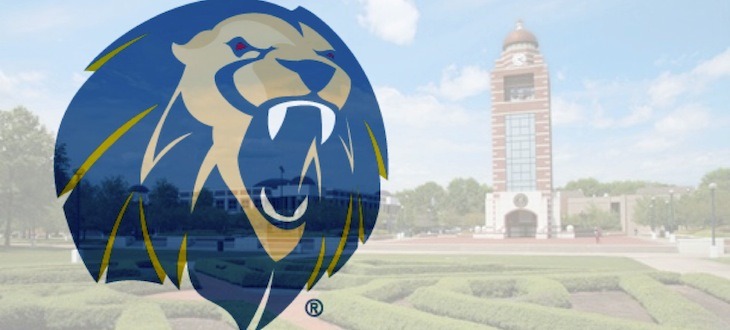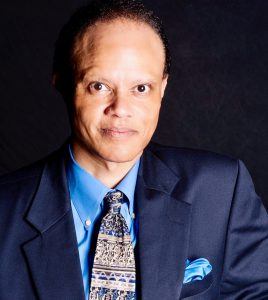Attorney, author leads inclusion workshops at UAFS, seeks ‘cultural competence’
by February 13, 2020 5:17 pm 825 views

Attorney, author and independent consultant Hannibal B. Johnson lectured on “From ‘Us and Them’ to ‘We’ – Examining Explicit and Implicit Biases” Wednesday (Feb. 12) at the University of Arkansas at Fort Smith and spent Thursday (Feb. 13) meeting with many different groups on campus in workshops and informal meetings in order to bring a focus to diversity, equity and inclusion to the campus.
He will continue meetings and workshops Friday (Feb. 14).
Johnson, a graduate of Harvard Law School who specializes in diversity, inclusion, and cultural competence issues, completed his undergraduate work in economics and sociology at the University of Arkansas and has served as an adjunct professor at The University of Tulsa College of Law, Oklahoma State University, and the University of Oklahoma.
A native of Fort Smith and graduate of Northside High School, Johnson serves on the federal 400 Years of African-American History Commission. He served as chair of the Rotary Club of Tulsa’s Diversity and Inclusion Committee and is a founding director of the Oklahoma Appleseed Center for Law and Justice.
“Cultural competence is a way of operationalizing diversity and inclusion,” Johnson said in his lecture. “It speaks to the power of being aware of, respecting, and learning with and from people who differ from us in a whole host of ways, including, but not limited to, gender, race, ethnicity, sexual orientation, age, religion, and ability status. Cultural competence focuses on awareness, attitudes, knowledge, and skills around diversity, equity, and inclusion.”
The lecture and the campus workshops and meetings are part of a plan for the university developed by Dr. Terisa Riley, UAFS chancellor. Riley formed a diversity, equity and inclusion committee last fall to “review, unify, and strengthen UAFS’s diversity and inclusion efforts,” the university’s website states. Membership is comprised of faculty, staff, students and members of the Fort Smith community “who are engaged in or passionate about diversity and inclusion initiatives.” The committee was formed after an allegation of race discrimination was made against the university’s head basketball coach.

On Sept. 2, Riley announced that the allegation had been reported by a former UAFS basketball player. A letter by Mr. and Mrs. Reginald Williams and Tyler Allen Williams, a former UAFS student and basketball player, was posted on Facebook Aug. 31. The letter described what the Williamses called a racist act by Boone in regards to the Tyler Williams “dreadlocks” hairstyle. Williams, from Edmund, Okla., was a guard and the second-leading scorer for UAFS for the 2018-19 season.
On Sept. 11, Riley reported that the university’s EOC officer did not find substantial evidence to support the claim of race discrimination but that “the process revealed a need for better communications when addressing a sensitive matter, particularly when raised by a student.” In her statement, Riley said the UAFS athletics department “will not condone or allow a policy, procedure, or practice – conveyed verbally or in writing – to dictate the hair styles or hair lengths for its student athletes.” Riley also said she would allocate resources to hire a director of campus diversity and inclusion. The committee also was formed. The position will report to the chancellor. Dr. Georgia Hale, provost and vice chancellor of academic affairs, has said they hope to have someone in the position before the end of the semester.
Because Johnson is able to bring powerful messages to a variety of groups and individuals by using many different means of communicating his message, Riley believed he could help the university’s efforts to create a community of equity and inclusion.
“Truthfully, I have been a fan of Mr. Johnson’s since our first introduction. As an educator, author, attorney, and citizen, his work is as powerful as it is transformative, and I am eager for the Fort Smith community to join us for his insightful and engaging discussion.”
Johnson said in his workshops at UAFS he aims to promote awareness and mutual respect, saying his exercises are designed to bring out the issues that need to be addressed as well as to develop strategies and a process to do so. Johnson said though the incident with the men’s basketball team presents UAFS with a big challenge because it created a “fair amount of negative publicity not just locally but nationally and caused” concern in the community, it also presents the university with an opportunity to look at what it is doing and how it can do more.
“Questions of are we doing enough, do we need to dedicate more resources, what needs to be done to make (the university) better for everyone need to be asked,” he said. “This critical moment that could be negative can become something that will propel actions to launch solidarity across the board.”
Johnson said he see that while UAFS is still in the beginning stages, the institution is moving in the right direction.
“They are listening to their constituents, that’s the students, the faculty, the staff, the people in the community. They are taking not of what is said, and they are taking action to build a more inclusive and welcoming environment,” Johnson said. “The proof of the pudding is in the eating. The question becomes will it be sustainable over time.”
Riley said she believes people on campus and throughout the community are noticing that work to equality and inclusion is not just words.
“They’ve had a lot of times that it’s just been words and no action. What they are seeing from me is action and continuing commitment from our whole university. I symbolize that at the top, but the truth is the real work is by everyone at the university. People doing the real work will have the opportunity to make a transformative change in the culture and the climate of this institution. And that doesn’t come fast and easy. It comes from seeing consistent movement from all of us that will make a big change,” Riley said.
